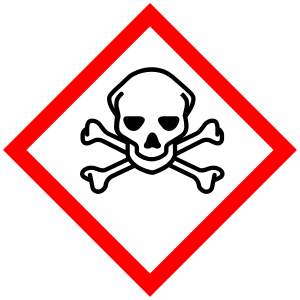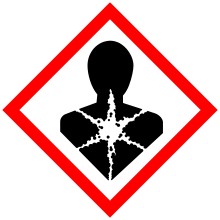Methyl yellow
 | |
| Names | |
|---|---|
| Preferred IUPAC name
N,N-Dimethyl-4-(phenyldiazenyl)aniline | |
| Other names
4-Dimethylaminoazobenzene p-Dimethylaminoazobenzene DAB N,N-Dimethyl-4-phenylazoaniline N,N-Dimethyl-4-aminoazobenzene Butter Yellow Solvent Yellow 2 C.I. 11020 | |
| Identifiers | |
| 60-11-7 | |
| 3D model (Jmol) | Interactive image |
| ChEMBL | ChEMBL263116 |
| ChemSpider | 5829 |
| ECHA InfoCard | 100.000.414 |
| EC Number | 200-455-7 |
| PubChem | 6053 |
| RTECS number | BX7350000 |
| UNII | A49L8E13FD |
| |
| |
| Properties | |
| C14H15N3 | |
| Molar mass | 225.30 g·mol−1 |
| Appearance | Yellow crystals |
| Melting point | 111–116 °C (232–241 °F; 384–389 K) decomposes[1] |
| 13.6 mg/l | |
| log P | 4.58 |
| Hazards | |
| Main hazards | Carcinogen[2] |
| GHS pictograms |   [1] [1] |
| GHS signal word | Danger |
| H301, H351[1] | |
| P281, P301+310[1] | |
| EU classification (DSD) |
|
| R-phrases | R25, R40 |
| S-phrases | S36/37, S45 |
| NFPA 704 | |
| US health exposure limits (NIOSH): | |
| PEL (Permissible) |
OSHA-regulated carcinogen[2] |
| REL (Recommended) |
Ca[2] |
| IDLH (Immediate danger) |
Ca [N.D.][2] |
| Except where otherwise noted, data are given for materials in their standard state (at 25 °C [77 °F], 100 kPa). | |
| | |
| Infobox references | |
Methyl yellow, or C.I. 11020, is a chemical compound which may be used as a pH indicator.
| Methyl yellow (pH indicator) | ||
| below pH 2.9 | above pH 4.0 | |
| 2.9 | ⇌ | 4.0 |
In aqueous solution at low pH, methyl yellow appears red. Between pH 2.9 and 4.0, methyl yellow undergoes a transition, to become yellow above pH 4.0.
Safety
It is a possible carcinogen.[3] As "butter yellow", the agent had been used as a food additive before its toxicity was recognized.[4] The result from consuming such chemicals is tumors on the liver.
See also
Structurally similar compounds:
References
- 1 2 3 4 Dimethyl yellow
- 1 2 3 4 "NIOSH Pocket Guide to Chemical Hazards #0220". National Institute for Occupational Safety and Health (NIOSH).
- ↑ "NIOSH Pocket Guide to Chemical Hazards #0220". National Institute for Occupational Safety and Health (NIOSH).
- ↑ Opie, E. L. (1944). "The Pathogenesis of Tumors of the Liver Produced by Butter Yellow" (pdf). The Journal of Experimental Medicine. 80 (3): 231–246. doi:10.1084/jem.80.3.231. PMC 2135460
 . PMID 19871411.
. PMID 19871411.
External links
- International Chemical Safety Card 1498
- "para-dimethylaminoazobenzene". Inchem.
- CDC - NIOSH Pocket Guide to Chemical Hazards
- Chung, K. T.; Fulk, G. E.; Andrews, A. W. (1981). "Mutagenicity testing of some commonly used dyes" (pdf). Applied and Environmental Microbiology. 42 (4): 641–648. PMC 244076
 . PMID 7039509.
. PMID 7039509.
This article is issued from Wikipedia - version of the 10/15/2016. The text is available under the Creative Commons Attribution/Share Alike but additional terms may apply for the media files.
